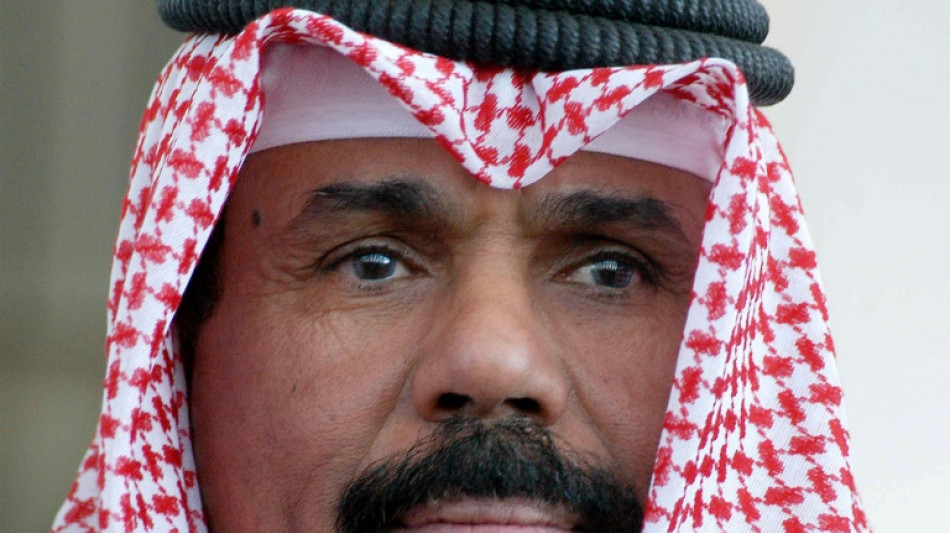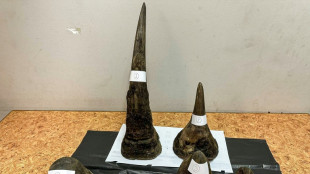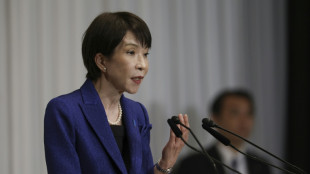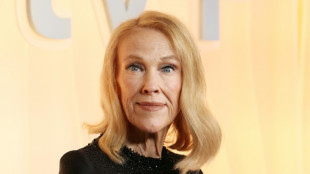
-
 Back to black: Philips posts first annual profit since 2021
Back to black: Philips posts first annual profit since 2021
-
South Korea police raid spy agency over drone flight into North

-
 'Good sense' hailed as blockbuster Pakistan-India match to go ahead
'Good sense' hailed as blockbuster Pakistan-India match to go ahead
-
Man arrested in Thailand for smuggling rhino horn inside meat

-
 Man City eye Premier League title twist as pressure mounts on Frank and Howe
Man City eye Premier League title twist as pressure mounts on Frank and Howe
-
South Korea police raid spy agency over drone flights into North

-
 Solar, wind capacity growth slowed last year, analysis shows
Solar, wind capacity growth slowed last year, analysis shows
-
'Family and intimacy under pressure' at Berlin film festival

-
 Basket-brawl as five ejected in Pistons-Hornets clash
Basket-brawl as five ejected in Pistons-Hornets clash
-
January was fifth hottest on record despite cold snap: EU monitor

-
 Asian markets extend gains as Tokyo enjoys another record day
Asian markets extend gains as Tokyo enjoys another record day
-
Warming climate threatens Greenland's ancestral way of life

-
 Japan election results confirm super-majority for Takaichi's party
Japan election results confirm super-majority for Takaichi's party
-
Unions rip American Airlines CEO on performance

-
 New York seeks rights for beloved but illegal 'bodega cats'
New York seeks rights for beloved but illegal 'bodega cats'
-
Blades of fury: Japan protests over 'rough' Olympic podium

-
 Zelensky defends Ukrainian athlete's helmet at Games after IOC ban
Zelensky defends Ukrainian athlete's helmet at Games after IOC ban
-
Jury told that Meta, Google 'engineered addiction' at landmark US trial

-
 Despite Trump, Bad Bunny reflects importance of Latinos in US politics
Despite Trump, Bad Bunny reflects importance of Latinos in US politics
-
Gaming Realms PLC Announces FY25 Pre-Close Trading Update

-
 Caledonia Mining Corporation Plc - Issue of Securities Pursuant to Long Term Incentive Plan Awards
Caledonia Mining Corporation Plc - Issue of Securities Pursuant to Long Term Incentive Plan Awards
-
Hemogenyx Pharmaceuticals PLC Announces Issue of Equity

-
 How Fort Myers Dentists Create Long-Term Care Plans for Healthy Smiles
How Fort Myers Dentists Create Long-Term Care Plans for Healthy Smiles
-
Nikon Introduces the ACTION and ACTION ZOOM Binoculars

-
 Australian PM 'devastated' by violence at rally against Israel president's visit
Australian PM 'devastated' by violence at rally against Israel president's visit
-
Vonn says suffered complex leg break in Olympics crash, has 'no regrets'

-
 YouTube star MrBeast buys youth-focused banking app
YouTube star MrBeast buys youth-focused banking app
-
French take surprise led over Americans in Olympic ice dancing

-
 Lindsey Vonn says has 'complex tibia fracture' from Olympics crash
Lindsey Vonn says has 'complex tibia fracture' from Olympics crash
-
US news anchor says 'hour of desperation' in search for missing mother

-
 Malen double lifts Roma level with Juventus
Malen double lifts Roma level with Juventus
-
'Schitt's Creek' star Catherine O'Hara died of blood clot in lung: death certificate

-
 'Best day of my life': Raimund soars to German Olympic ski jump gold
'Best day of my life': Raimund soars to German Olympic ski jump gold
-
US Justice Dept opens unredacted Epstein files to lawmakers

-
 Epstein taints European governments and royalty, US corporate elite
Epstein taints European governments and royalty, US corporate elite
-
Three missing employees of Canadian miner found dead in Mexico

-
 Meta, Google face jury in landmark US addiction trial
Meta, Google face jury in landmark US addiction trial
-
Winter Olympics organisers investigate reports of damaged medals

-
 Venezuela opposition figure freed, then rearrested after calling for elections
Venezuela opposition figure freed, then rearrested after calling for elections
-
Japan's Murase clinches Olympic big air gold as Gasser is toppled

-
 US athletes using Winter Olympics to express Trump criticism
US athletes using Winter Olympics to express Trump criticism
-
Japan's Murase clinches Olympic big air gold

-
 Pakistan to play India at T20 World Cup after boycott called off
Pakistan to play India at T20 World Cup after boycott called off
-
Emergency measures hobble Cuba as fuel supplies dwindle under US pressure

-
 UK king voices 'concern' as police probe ex-prince Andrew over Epstein
UK king voices 'concern' as police probe ex-prince Andrew over Epstein
-
Spanish NGO says govt flouting own Franco memory law

-
 What next for Vonn after painful end to Olympic dream?
What next for Vonn after painful end to Olympic dream?
-
Main trial begins in landmark US addiction case against Meta, YouTube

-
 South Africa open T20 World Cup campaign with Canada thrashing
South Africa open T20 World Cup campaign with Canada thrashing
-
Epstein accomplice Maxwell seeks Trump clemency before testimony


Kuwait's Sheikh Nawaf: a short but tumultuous reign
Sheikh Nawaf al-Ahmad Al-Sabah served as Kuwait's emir for just three years but spent decades in top posts through the House of Sabah's tumultuous rule of the oil-rich state.
Sheikh Nawaf, who died on Saturday aged 86, was defence minister when Iraq invaded in 1990, setting off a war that drew in armies from around the world to end the occupation.
He was interior minister when Kuwaiti security forces battled Islamist militants in January 2005.
Despite the episodes that have deeply marked Kuwait's history, Sheikh Nawaf's low-key style never saw him fall out of favour.
He was named crown prince in 2006 by his half-brother Sheikh Sabah al-Ahmad Al-Sabah and took over as emir when he died in September 2020 at the age of 91.
The current crown prince, Sheikh Mishal al-Ahmad al-Sabah, another half-brother, is 83 and much attention will now be focused on whether a younger ruler is brought in by the family.
Sheikh Nawaf showed a rare sign of public emotion when he was formally sworn in by the Gulf state's Gulf state's national assembly in 2020.
Born in 1937, Sheikh Nawaf was the fifth son of Kuwait's late ruler from 1921 to 1950 Sheikh Ahmad al-Jaber Al-Sabah.
He received secondary schooling in Kuwait but did not go on to higher education.
He started his political career at 25 as governor of Hawalli province, where he remained until 1978, before taking on the role of interior minister for a decade.
- Battered economy -
Sheikh Nawaf became defence minister two years before the start of the seven-month Iraqi occupation in 1991.
After the liberation by a US-led international force, he was named minister for social affairs and excluded from the government formed after the first post-war election in 1992.
Sheikh Nawaf returned as deputy commander of the national guard in 1994 and in 2003 became interior minister again.
This period was marked by a series of deadly clashes between Kuwaiti security forces and Islamic militants in January 2005.
On becoming emir, Sheikh Nawaf had to steer the economy through a crisis caused by a fall in oil prices that saw Kuwait's credit rating cut by international agencies in 2020.
He acknowledged the "serious" challenges in his inauguration speech and the government spent heavily -- doubling public debt in 18 months -- to guide the state through the Covid-19 pandemic.
He made few dramatic changes, however.
Kuwait has maintained its hardline stance on Israel even as Bahrain and the United Arab Emirates have established relations. It remains a diplomatic rarity in maintaining close relations with both Saudi Arabia and its regional rival Iran.
Mohammed al-Faily, an expert in constitutional law at Kuwait University, said Sheikh Nawaf was generally considered "a calm person who, when it calls for it, can take firm decisions".
The future for the royal family remains uncertain.
There are bitter divisions within the Sabah family, with lurid accusations of corruption and political conspiracies lodged by some members against rivals.
Kuwait's constitution stipulates only that the ruler should be a descendant of the nation's founder, Mubarak Al-Sabah. By tradition, the throne had alternated between the Salem and Jaber branches of the family.
But that pattern has been broken this decade, with Sheik Sabah, Sheikh Nawaf and the heir-apparent Sheikh Mishal all from the Jaber clan.
Y.Kobayashi--AMWN

